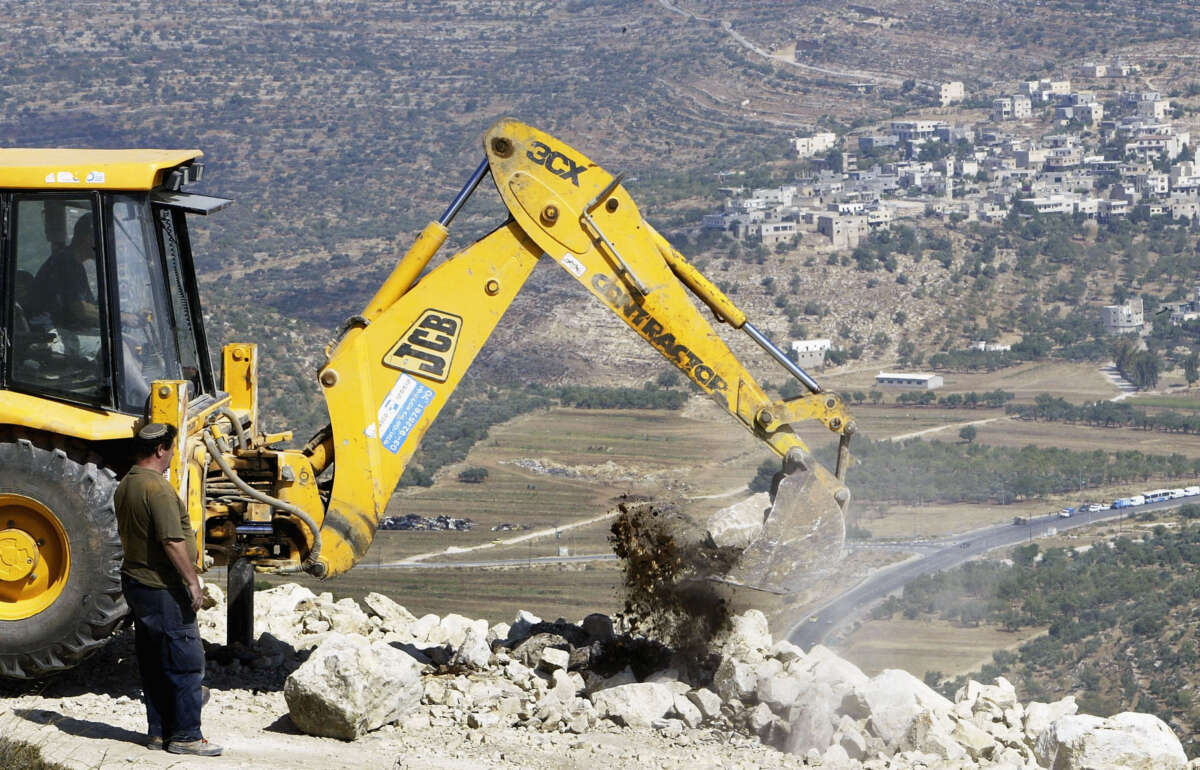Did you know that Truthout is a nonprofit and independently funded by readers like you? If you value what we do, please support our work with a donation.
Israel’s far-right Security Cabinet on Sunday approved the immediate “legalization” of nine Jewish-only settler outposts in the occupied West Bank and East Jerusalem over what critics called the empty objection of benefactor the United States and in violation of international law — under which all Israeli settler colonies are illegal.
National Security Minister Itamar Ben-Gvir and Finance Minister Bezalel Smotrich both claimed responsibility for the action, in which they sought government recognition of 77 illegal settler outposts. The ministers and other Israeli officials said the move was in response to recent deadly attacks against Jews by Palestinian resistance fighters, including a vehicular assault that killed three people — two of them young children — near East Jerusalem’s Ramot neighborhood on Friday.
“It is not enough and we want more, but it is an important start,” Ben-Gvir, who leads the ultranationalist Otzma Yehudit (Jewish Power) party, tweeted Sunday. “The training of the settlements will join the extensive police activity in East Jerusalem, and another series of measures to deter terrorism,” he added, a reference to the cabinet’s move to increase the number of security forces in Jerusalem and ramp up operations in Palestinian neighborhoods of occupied East Jerusalem.
The nine settler outposts — Avigayil, Beit Hogla, Givat Harel, Givat Ha-Roeh, Givat Arnon, Mitzpe Yehuda, Malchai HaShalom, Asa-el, Sde Boaz, and Shaharit — were considered illegal even under Israeli law. Under international law, all settlements, in which anti-Arab apartheid is strictly enforced, are illegal. Most were built on land seized from Palestinians through terrorism and ethnic cleansing during the Nakba, or catastrophe, when more than 700,000 Arabs were expelled during the establishment and consolidation of modern Israel in 1947-49, and during the conquest of the West Bank, East Jerusalem, Gaza, and the Syrian Golan Heights in 1967.
Israel’s Civil Administration is set to meet in the coming days to green-light the construction of thousands of homes in existing apartheid colonies and to build more infrastructure to connect the communities with each other and Israel.
Ben-Gvir also told police to prepare for a new Operation Defensive Shield — a reference to the 2002 offensive that killed more than 400 Palestinians during the second intifada, or general uprising — “to root out terror nests… and reach the terrorists at their homes,” according to the Times of Israel.
A senior Israeli official quoted anonymously by the Times of Israel slapped down Ben-Gvir’s call, explaining that “decisions of such a scale are not made in statements by one minister or another on a sidewalk at the scene of an attack.”
The group Canadians for Justice and Peace in the Middle East tweeted a reminder that “every settlement is illegal under international law,” while Richard Burden, the vice-chair of the U.K. group Labour Friends of Palestine, said that “whatever the Netanyahu government decides to authorize, under international law the entire West Bank remains occupied territory, all the settlements built there are illegal, and Israel is in breach of its obligations under Geneva Convention.”
Both Article 49 of the Fourth Geneva Convention and the International Criminal Court Rome Statute prohibit settlement activity. According to Article 8(2) of the Rome Statute, “the transfer, directly or indirectly, by an occupying power of parts of its own civilian population into the territory it occupies, or the deportation or transfer of all or parts of the population of the occupied territory within or outside this territory” are unlawful. In 2021, United Nations Palestine expert Michael Lynk said Israeli settlements should be classified as war crimes under the Rome Statute.
From 1978 until 2019, the United States State Department also considered Israeli settlements unlawful.
The decision to grant legal status to the nine settlements came despite the stated objections of the United States, which provides Israel with $3.8 billion in annual military aid, as well as diplomatic cover for what former U.S. President Jimmy Carter called “worse… apartheid than what we saw in South Africa,” invasions, ethnic cleansing, and other repression.
“Our position on these matters has been clear and consistent,” an unnamed Biden administration official told Axios Middle East correspondent Barak Ravid. “We strongly oppose expansion of settlements, and we’re deeply concerned by reports about a process to legalize outposts that are illegal under Israeli law.”
According to the Israeli human rights group B’Tselem, more than 620,000 Jews currently reside in around 140 settlements in the West Bank and East Jerusalem. While Israel grants every Jew in the world the right to settle in Israel, it has — against U.N. resolutions and international law — refused to allow the approximately five million Palestinian refugees alive today to return to their homeland.
Press freedom is under attack
As Trump cracks down on political speech, independent media is increasingly necessary.
Truthout produces reporting you won’t see in the mainstream: journalism from the frontlines of global conflict, interviews with grassroots movement leaders, high-quality legal analysis and more.
Our work is possible thanks to reader support. Help Truthout catalyze change and social justice — make a tax-deductible monthly or one-time donation today.
